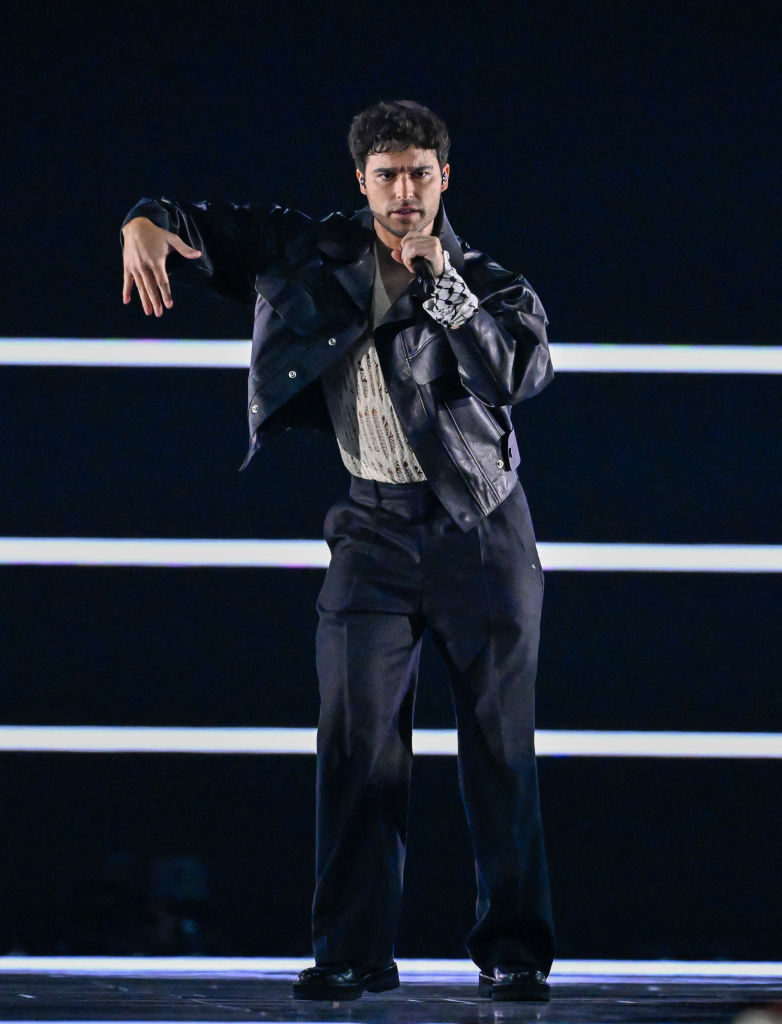The European Broadcasting Union (EBU) issued a statement saying it “regretted” that a performer at the first semi-final of this year’s Eurovision Song Contest on Tuesday wore a Palestinian keffiyeh on his arm, saying the garment served to “compromise the non-political nature of the event.”
Swedish singer Eric Saade, whose father is of Palestinian descent, was one of several performers at Tuesday’s contest. He is not a participant but, as Sweden is hosting the contest this year, the EBU traditionally welcomes former competitors to reprise their entries to celebrating the host country.
Saade performed his 2011 competing song “Popular” and reportedly did not verbalize any political statements, only wearing the Palestinian scarf on his arm. The keffiyeh has long been associated with anti-Israel sentiment and has become a popular item at recent protests opposing Israel’s self-defense operations against the Palestinian terrorist organization Hamas. Reports indicate that Saade did not wear the keffiyeh during rehearsals, so the EBU was not expecting its presence.
“All performers are made aware of the rules of the contest,” the EBU said in a statement to the Times of Israel. “We regret that Eric Saade chose to compromise the non-political nature of the event.”
The EBU had issued statements prior to the contest emphasizing that the only flags allowed at the contest were those of countries participating and the “rainbow” LGBT community flags, specifying that Palestinian flags have never been allowed at the event.
The EBU’s rules do not explicitly ban keffiyehs, but EBU communications head Michelle Roverelli reiterated prior to the semifinal that organizers reserve the right to “remove any other flags or symbols, clothing, items and banners being used for the likely purpose of instrumentalizing the TV shows.” At least one competitor on Tuesday, Irish performer “Bambie Thug,” said organizers banned body writings in an ancient Irish language reading “freedom for Palestine” from the performance. Bambie Thug identifies as “non-binary” and waved a transgender flag following the performance.
Saade responded to the criticism on Instagram, explaining that he received the keffiyeh from his father and calling the EBU racist.
“This was just my way of showing a part of my origin, which is important in a world like this. I got that keffiyeh from my dad when I was a little boy, to never forget where the family comes from,” Saade wrote. “Back then, I didn’t know it would one day be called a ‘political symbol by EBU, It’s like calling the ‘Swedish Dala horse’ a political symbol.”
“In my eyes it’s just racism,” Saade concluded. “I just wanted to be inclusive and wear something that is authentic to me – but the EBU seems to think my ethnicity is controversial. It says nothing about me, but everything about them.”
Saade has vocally condemned Israel’s anti-terrorist actions in Gaza on social media, calling the country “the most dangerous and disgusting nations [sic] in the world” in December. More recently, Saade appeared to condemn the ban on pro-Palestinian propaganda at the EBU on social media.

Eric Saade performs his song “Popular” as the opening act during the first semi-final of the 68th edition of the Eurovision Song Contest (ESC) at the Malmo Arena, in Malmo, Sweden, on May 7, 2024. (JESSICA GOW/TT/TT News Agency/AFP via Getty Images)
The Eurovision Song Contest is an annual event in which participating countries – including non-European states such as Australia and Israel – send a performer to compete with an original song. The winner is chosen through a mix of popular vote and professional judges. Bitter political rivalries are often a concern for the competition, whose rules explicitly state that all political statements are banned, except LGBTQIAP2S+ flags, but this year organizers have expressed heightened worries that anti-Israeli sentiment will cloud the contest.
Malmö, Sweden, a city plagued by Islamist violent in the past decade, is hosting the event, requiring expanded security efforts to protect performers and spectators. Israel’s participation – with a song originally intended to honor the victims of the Hamas atrocities of October 7, but since rewritten to fit the EBU’s “no politics” rule – has prompted widespread outrage and calls for Israel to be banned, including from Swedish artists such as Saade. Saade was among 1,000 Swedish musicians signing a letter claiming Israel’s presence “undermines not only the spirit of the contest but the entire public service mission. It also sends the signal that governments can commit war crimes without consequences.”
The EBU has refused to ban Israel and rarely bans nations from participating for political reasons. Notably, Azerbaijan also participated in this year’s contest despite concluding a genocide against Christian Armenians in the disputed region of Nagorno-Karabakh this year. No prominent Swedish artists have called for a ban on Azerbaijan’s presence at Eurovision.
In response to concerns about potential pro-Palestinian riots in Malmö and violence against Jews in general, the government of Israel issued a warning discouraging Israelis from supporting their performer at Eurovision this year.
The major exception to the rule is Russia, which the EBU banned in 2022 in response to strongman Vladimir Putin’s full-scale invasion of Ukraine. Saade’s song “Popular” samples the 1978 disco song “Rasputin” by Boney M, an homage to a controversial Russian political icon. He has not at press time faced repercussions for the Russian-inspired sample in his song resembling those in response to the keffiyeh.

COMMENTS
Please let us know if you're having issues with commenting.